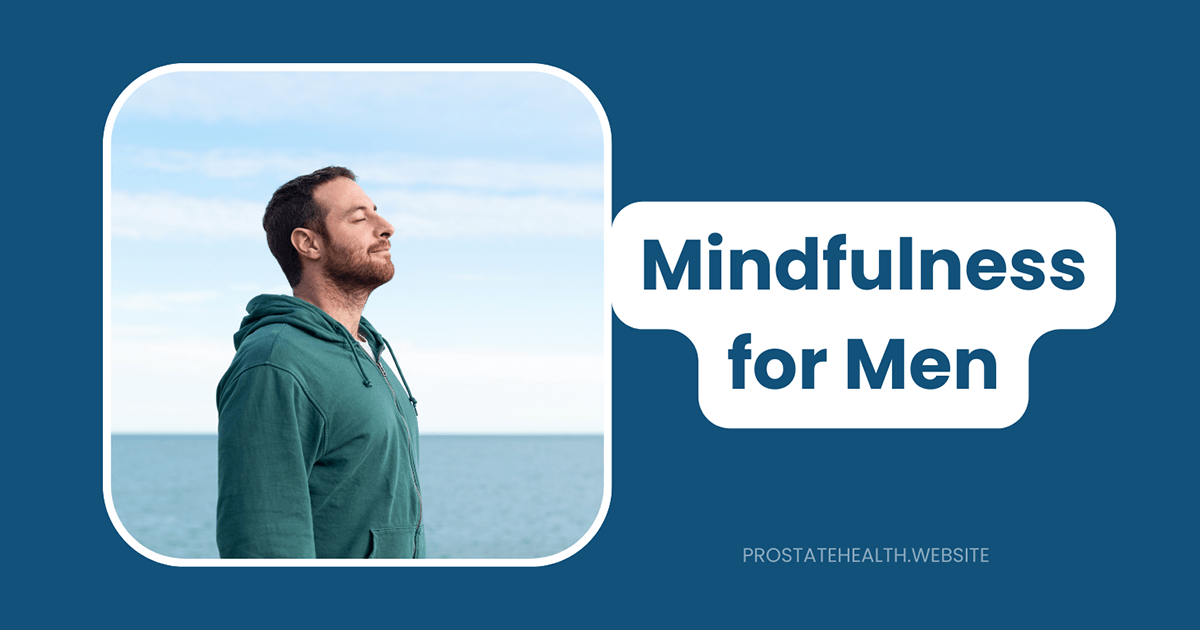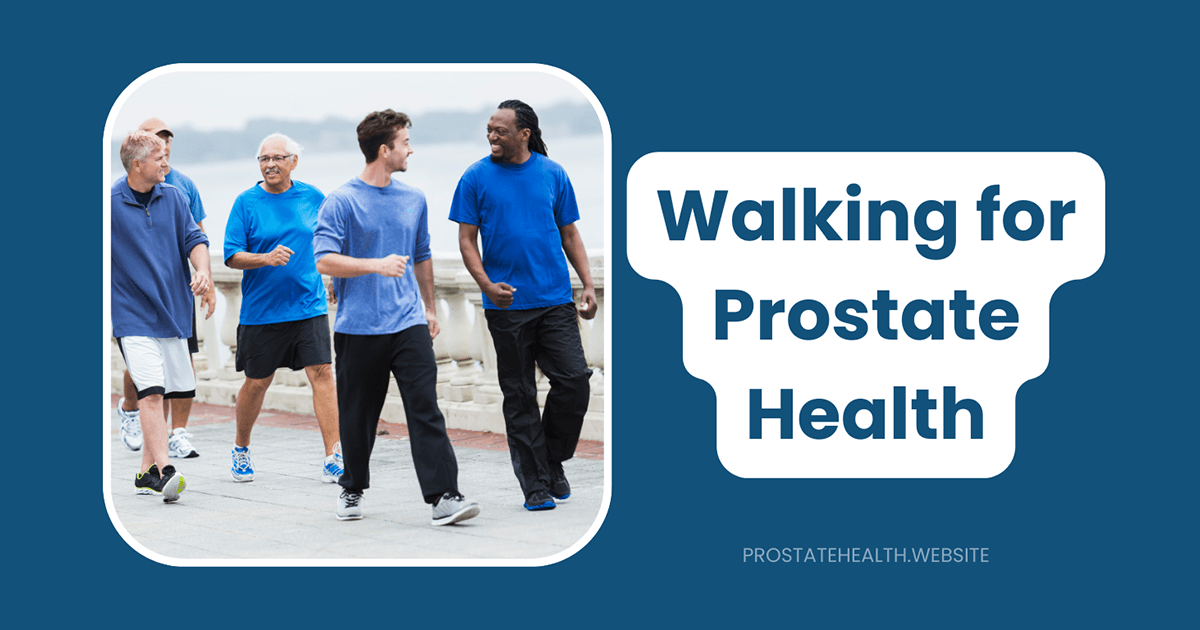Mindfulness Practices for Men with Prostate Concerns: Finding Peace Amid Uncertainty

When I was first diagnosed with an enlarged prostate at 48, my doctor handed me a prescription and a pamphlet about dietary changes. What he didn’t mention—and what took me years to discover—was how profoundly my mental state affected my symptoms.
On high-stress days, my urinary frequency would skyrocket. During periods of anxiety, my sleep was shattered by nighttime bathroom trips. It wasn’t until I began exploring mindfulness practices that I recognized the powerful connection between my mind and my prostate health.
If you’re one of the millions of men navigating prostate concerns—whether BPH, prostatitis, or prostate cancer—understanding this connection could transform your experience.
The Science Behind Stress and Prostate Health
The relationship between stress and prostate health isn’t just anecdotal—it’s backed by emerging research:
- Inflammation Response: Chronic stress triggers the release of cortisol, which can increase inflammation throughout the body, including the prostate gland. A 2023 study published in Prostate found that men with elevated stress biomarkers showed significantly higher levels of prostatic inflammation.
- Muscle Tension: Psychological stress often manifests as physical tension in the pelvic floor muscles, which can exacerbate urinary symptoms and prostate discomfort. This creates a vicious cycle where physical symptoms increase mental stress, which further tightens the pelvic floor.
- Hormonal Impact: Stress disrupts hormonal balance, potentially affecting testosterone levels and other hormones that influence prostate health. Research from the Journal of Clinical Endocrinology & Metabolism has demonstrated that chronic stress can alter hormonal profiles in ways that may impact prostate tissue.
- Immune Function: Prolonged stress suppresses immune function, which may affect the body’s ability to regulate prostate cell growth and address inflammation.
Mindfulness: A Powerful Tool for Prostate Health
Mindfulness—the practice of bringing non-judgmental awareness to the present moment—offers particular benefits for men with prostate concerns. Here’s why it works:
For Men with BPH (Enlarged Prostate)
BPH symptoms like frequent urination, urgency, and nighttime bathroom trips can create significant anxiety. This anxiety then exacerbates the very symptoms you’re worried about.
Dr. Herbert Benson, founder of the Mind/Body Medical Institute at Harvard, explains: “The relaxation response achieved through mindfulness practices can reduce sympathetic nervous system activity, which may help relax the smooth muscle of the bladder and prostate, potentially easing urinary symptoms.”
A 2025 multicenter study found that men with BPH who practiced daily mindfulness reported a 27% reduction in urinary symptom scores compared to a control group.
For Men with Prostatitis
Chronic prostatitis/chronic pelvic pain syndrome (CP/CPPS) has strong connections to stress and tension. Mindfulness practices can:
- Reduce pain perception through improved pain processing in the brain
- Release tension in the pelvic floor muscles
- Break the cycle of pain-related anxiety
- Improve sleep quality, which supports healing
A study from the National Institute of Health found that an 8-week mindfulness program reduced pain scores by 43% in men with CP/CPPS, with benefits persisting at the one-year follow-up.
For Men with Prostate Cancer
The psychological burden of a prostate cancer diagnosis—whether you’re undergoing treatment or following active surveillance—can be overwhelming. Research shows mindfulness can help:
- Reduce anxiety about PSA tests and follow-up appointments
- Decrease fear of cancer progression
- Improve emotional resilience
- Enhance quality of life during and after treatment
Northwestern University researchers found that men on active surveillance for prostate cancer who participated in mindfulness training showed “statistically significant improvements in prostate cancer anxiety” and “greater resilience over time.”
Five Mindfulness Practices Tailored for Prostate Health
1. Body Scan Meditation for Pelvic Relaxation
The Practice: Lie comfortably on your back. Beginning at your toes, gradually bring awareness to each part of your body, moving upward. When you reach your pelvic area, spend extra time noticing any tension and consciously releasing it.
Why It Works: Many men unconsciously hold tension in their pelvic floor, which can aggravate prostate symptoms. The body scan helps identify and release this hidden tension.
How to Start: Try this guided pelvic floor relaxation meditation specifically designed for men with prostate concerns.
2. Mindful Urination Practice
The Practice: During urination, bring full attention to the sensation. Notice the feeling of release, the sound, the relief. Avoid straining or rushing.
Why It Works: This practice helps retrain the brain-bladder connection and reduces anxiety around urination, which can improve flow and reduce frequency over time.
How to Start: Begin by simply taking three conscious breaths before each urination. Gradually extend your mindful awareness throughout the entire process.
3. Breath-Focused Meditation for Stress Reduction
The Practice: Sit comfortably with your spine straight. Focus on your natural breath, noticing the sensation of air entering and leaving your nostrils. When your mind wanders (which it will), gently return focus to your breath.
Why It Works: This fundamental meditation practice activates the parasympathetic nervous system, reducing cortisol levels and inflammation that may affect the prostate.
How to Start: Begin with just 5 minutes daily, gradually increasing to 20 minutes. Apps like Calm or Headspace offer guided sessions specifically for beginners.
4. Loving-Kindness Meditation for Healing
The Practice: Sit comfortably and begin by directing thoughts of compassion toward yourself: “May I be healthy. May I be at ease.” Gradually extend these wishes to others, including those supporting you through your health journey.
Why It Works: This practice reduces self-criticism that often accompanies health challenges and activates positive emotional states that support healing. Research from the Center for Healthy Minds shows this practice can significantly reduce inflammatory markers in the body.
How to Start: Join a monthly virtual loving-kindness session specifically for men with prostate concerns.
5. Mindful Movement for Prostate Health
The Practice: Gentle yoga, tai chi, or qigong with awareness focused on the sensations in your body as you move.
Why It Works: These practices combine the benefits of physical activity (improved circulation to the prostate region) with mindfulness (reduced stress and tension).
How to Start: Try a 15-minute gentle yoga sequence designed specifically for prostate health.
Real Men, Real Results: Success Stories
James, 62, BPH: “After three months of daily meditation, my nighttime bathroom trips decreased from 4-5 times to just once. My urologist was surprised enough to note it in my chart.”
Michael, 57, Prostatitis: “The pain had controlled my life for years. Mindfulness didn’t eliminate it completely, but it changed my relationship with it. I no longer catastrophize when symptoms flare, which actually seems to make the flares less severe and shorter.”
Robert, 68, Prostate Cancer: “Active surveillance was mentally harder than I expected. The mindfulness program taught me to observe my cancer fears without being consumed by them. My PSA is still closely monitored, but my quality of life has dramatically improved.”
Getting Started: Your 7-Day Mindfulness Challenge
The benefits of mindfulness for prostate health aren’t theoretical—they’re available to you starting today. Here’s a simple 7-day plan to begin:
- Day 1: Practice 5 minutes of simple breath awareness
- Day 2: Try a body scan meditation with focus on the pelvic area
- Day 3: Practice mindful urination three times during the day
- Day 4: Extend your breath meditation to 7 minutes
- Day 5: Try a loving-kindness meditation focused on healing
- Day 6: Practice 10 minutes of mindful movement
- Day 7: Reflect on changes in your symptoms and stress levels
When to Seek Additional Support
While mindfulness can be a powerful complement to medical care for prostate conditions, it’s not a replacement for proper treatment. Consult your healthcare provider if you experience:
- Sudden changes in urinary patterns
- Blood in urine
- Severe pain
- Fever or chills
- Significant emotional distress or depression
Many urologists now recognize the mind-body connection in prostate health. Ask your doctor about integrative approaches that combine conventional treatment with mindfulness practices.
Conclusion: Mindfulness as Part of Your Prostate Health Toolkit
The journey with prostate health challenges isn’t just physical—it’s psychological and emotional as well. By incorporating mindfulness practices into your daily routine, you’re addressing an often-overlooked dimension of healing.
Remember that mindfulness is a skill that develops with practice. Be patient with yourself as you begin, and notice even small improvements in your symptoms and quality of life.
Have you tried mindfulness practices for your prostate health? Share your experience in the comments below.






